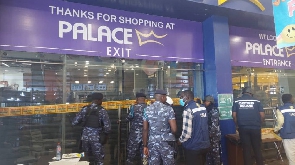 A branch of Palace Mall being closed
A branch of Palace Mall being closed
Over the past few days, the Ghana Revenue Authority (GRA) have closed down some retail businesses, including the China Mall and the Palace Mall. This exercise has caused a divide among Ghanaians. Persons affected, including workers and customers of these malls, believe the closure is unnecessary. Other Ghanaians have, however, argued that the closure is long overdue if these entities have truly been evading tax and denying the country the much-needed revenue for its development. Here is why the GRA shutdown these entities: What many Ghanaians do not know is that the closure of branches of Palace Mall and China Mall was because they failed to enrol on a Certified Invoicing System for the administration of Value Added Tax (VAT) in Ghana following the amendment of the VAT Act 870. According to the Deputy Commissioner, Operations-DTRD, Kwesi Eghan, the Palace Mall and China Mall are part of 50 selected tax-paying companies that are supposed to be enrolled on the Certified Invoicing System. He indicated that the deadline for enrolment on the system was October 12, 2022, and that only 25 out of the 50 entities have complied. Kwesi Eghan also said that the GRA hopes to enrol 600 large taxpayers into the system in its first implementation phase, which is expected to end in December 2023. He added that by 2024, all taxpayers would have been fully integrated into the platform. The Deputy Commissioner explained that the move is necessary to help improve Ghana’s domestic tax mobilization efforts. “We want to improve compliance. We are more interested in collaboration than chaining businesses to pay their taxes. But we have no option at this moment than to move swiftly to ensure the right thing is done,” he said. Watch the latest episode of BizTech below:
Over the past few days, the Ghana Revenue Authority (GRA) have closed down some retail businesses, including the China Mall and the Palace Mall. This exercise has caused a divide among Ghanaians. Persons affected, including workers and customers of these malls, believe the closure is unnecessary. Other Ghanaians have, however, argued that the closure is long overdue if these entities have truly been evading tax and denying the country the much-needed revenue for its development. Here is why the GRA shutdown these entities: What many Ghanaians do not know is that the closure of branches of Palace Mall and China Mall was because they failed to enrol on a Certified Invoicing System for the administration of Value Added Tax (VAT) in Ghana following the amendment of the VAT Act 870. According to the Deputy Commissioner, Operations-DTRD, Kwesi Eghan, the Palace Mall and China Mall are part of 50 selected tax-paying companies that are supposed to be enrolled on the Certified Invoicing System. He indicated that the deadline for enrolment on the system was October 12, 2022, and that only 25 out of the 50 entities have complied. Kwesi Eghan also said that the GRA hopes to enrol 600 large taxpayers into the system in its first implementation phase, which is expected to end in December 2023. He added that by 2024, all taxpayers would have been fully integrated into the platform. The Deputy Commissioner explained that the move is necessary to help improve Ghana’s domestic tax mobilization efforts. “We want to improve compliance. We are more interested in collaboration than chaining businesses to pay their taxes. But we have no option at this moment than to move swiftly to ensure the right thing is done,” he said. Watch the latest episode of BizTech below: